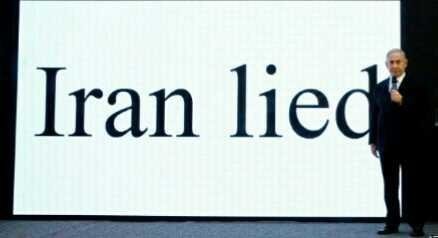Binyamin Netanyahu tries to convince Donald Trump to scuttle the Iran deal But he has presented no evidence that Iran

IT WAS one of the most hyped PowerPoint presentations in history. “Game changing”, “very significant” and “dramatic”, was how aides to Binyamin Netanyahu, Israel’s prime minister, described it. To many viewers, it did not disappoint. On April 30th Mr Netanyahu (pictured) unveiled 55,000 pages stolen by Israeli spies, fully half a ton of material related to Iran’s nuclear programme. He showed off photographs of test devices and blueprints of warheads. The “secret atomic archive” proved beyond any doubt, said Mr Netanyahu, that Iran had for years sought to develop nuclear weapons.
The presentation seemed aimed at an audience of one: President Donald Trump, who must decide by May 12th whether to pull America out of a deal under which Iran agreed to halt its nuclear-weapons programme in return for sanctions relief. Other signatories, including Britain, France and Germany, have tried to convince Mr Trump to stay in the agreement. They have worked with America to try to fix what the president regards as the deal’s fatal flaws. But Mr Netanyahu said that the deal was “based on lies” and, therefore, never should have been struck.
The problem with Mr Netanyahu’s argument is that nearly all of the information he presented had been documented by the International Atomic Energy Agency (IAEA) before 2015. Despite Iran’s protestations that its nuclear programme had only ever been for civilian use, the IAEA and Western governments had little doubt that its aim was to get nuclear weapons. American intelligence agencies concluded that Iran suspended much of its bomb-making activity in 2003, though some elements continued. Indeed, it was because of this that America and others pursued the nuclear deal.
The signatories did not insist that Iran admit everything it had done in the past, because that might have scuppered the negotiations. Instead they fudged it and ensured that Iran’s untrustworthiness was reflected in an obligation to open itself up to unprecedented inspections by the IAEA.
Critics, including Mr Netanyahu and Mr Trump, say that the inspections of military sites leave the Iranians ample time to hide nuclear-weapons material. They also complain that the deal does not cover Iran’s ballistic-missile programme, which has continued since 2015, and that it allows constraints on Iran’s nuclear programme to eventually expire—at which time it might use the old blueprints to build a bomb.
Yet few argue that the deal is not currently effective. Mr Netanyahu failed to present any proof that Iran is violating the agreement. None of the material obtained by Israel’s spies pertains to the period since it was signed. In an interview in March, the chief of staff of Israel’s armed forces, Gadi Eizenkot, said, “Right now the agreement, with all its faults, is working and is putting off realisation of the Iranian nuclear vision by ten to 15 years.”
Critics have struggled to come up with an alternative, short of military strikes, that would contain Iran’s nuclear ambitions. Still, the White House seems determined to scrap the deal. It said Mr Netanyahu provided “new and compelling details about Iran’s efforts to develop missile-deliverable nuclear weapons.”
Israel is confronting Iran in other areas, too. Mr Netanyahu’s presentation came less than a day after missile strikes on targets in Syria killed over a dozen people, many of them Iranians. Suspicion has fallen on Israel, which has hit Iranian bases in Syria in the past. Analysts worry that increasing friction between the countries could eventually lead to an all-out war. The unravelling of the nuclear deal has heightened such fears.
Source: www.theeconomist.com